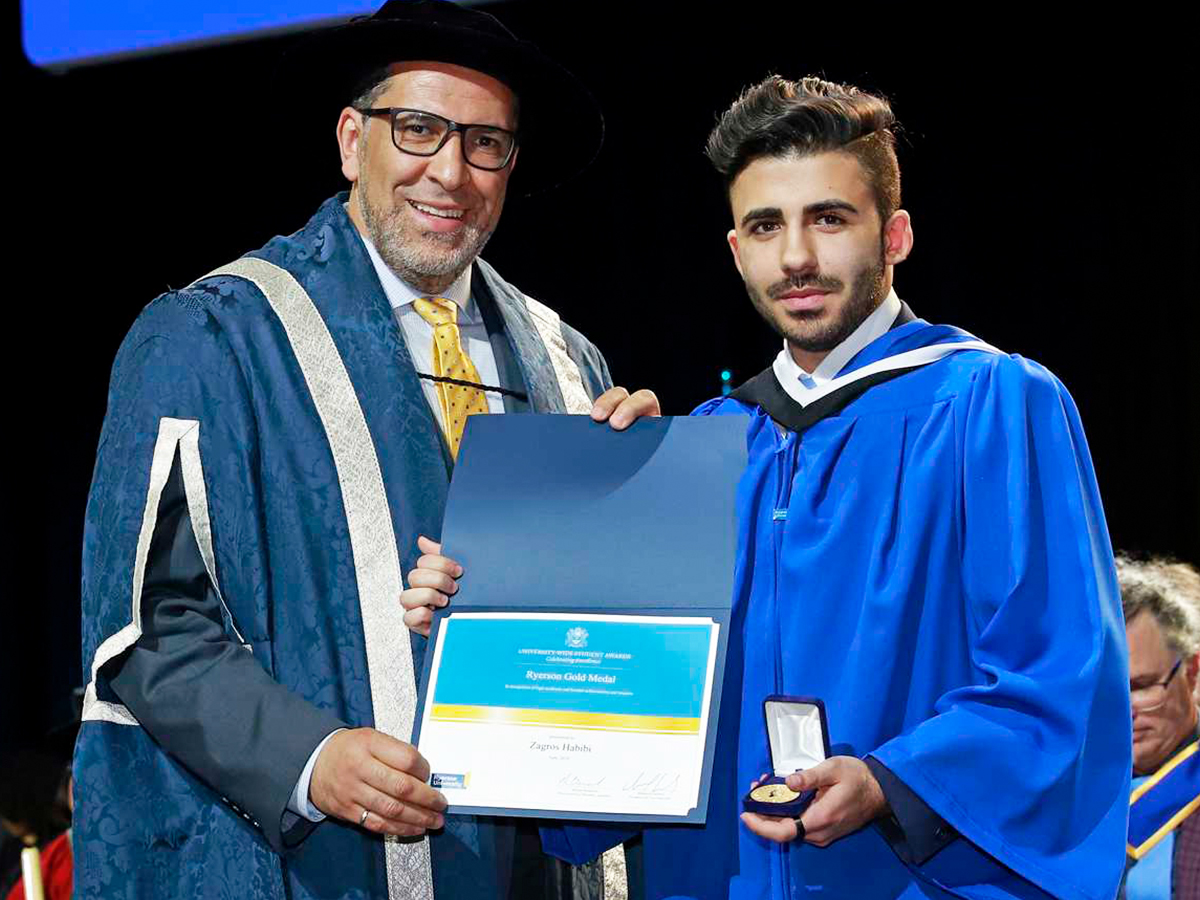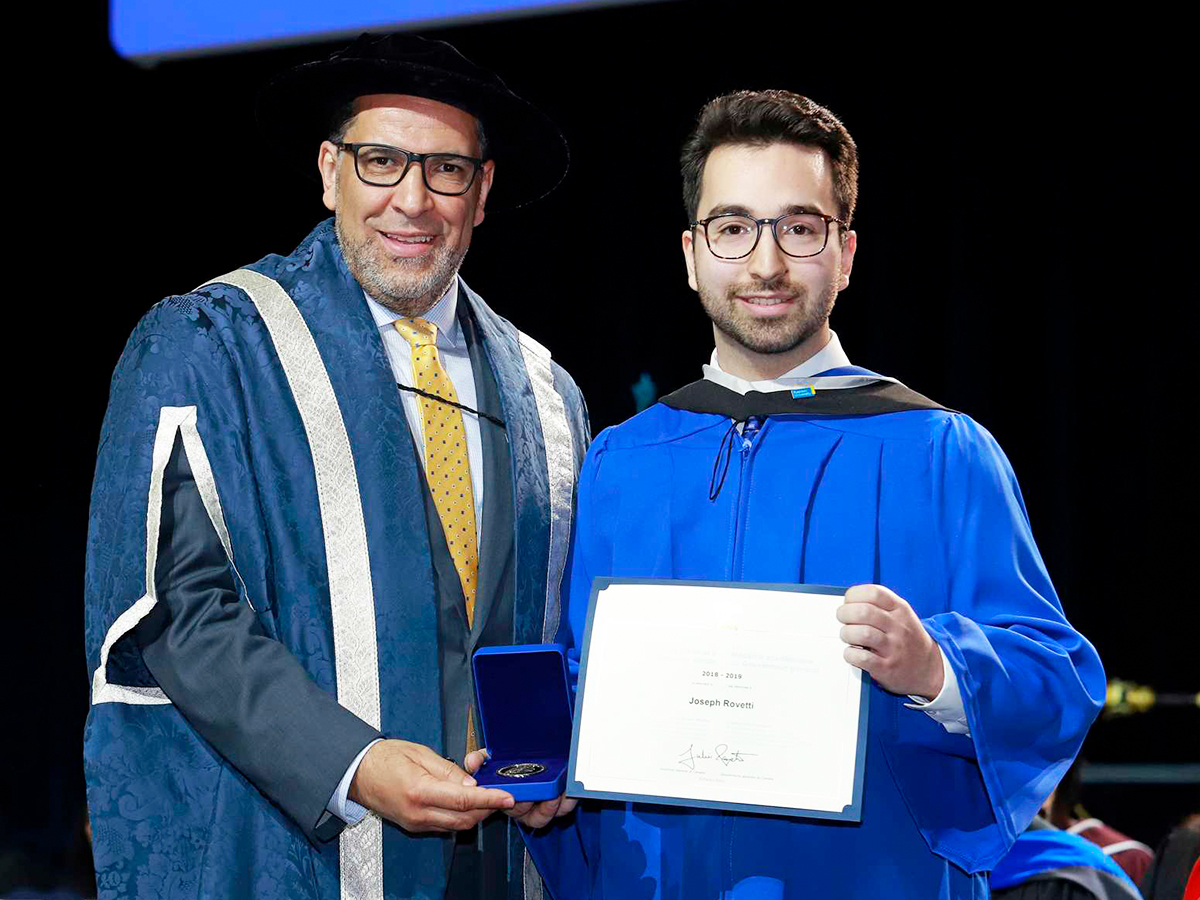Pathway to academic success

President Mohamed Lachemi poses with Zagros Habibi, recipient of the 2019 Ryerson Gold Medal (Arts) and a politics and public administration graduand, during his convocation ceremony on June 12. Photo credit: LifeTouch
Convocation is a time when students celebrate many milestones in their academic career at Ryerson with their family and friends. It is also a time when students are recognized for achieving the highest academic standing in their faculties.
This year, 11 such students will receive either a Ryerson Gold Medal, a Board of Governor Leadership Award and Medal or a Governor General’s Academic Silver Medal, awards that are among the highest honours a student can achieve.
Ryerson Today sits down with two Arts convocation medal award recipients to find out how they achieved this feat, and what advice they would pass on their first-year peers:
Q&A with Zagros Habibi, a politics and public administration graduand, on winning the Ryerson Gold Medal (Arts):
1. What does winning the Ryerson Gold Medal for Arts mean to you?
Winning the Ryerson Gold Medal Award has meant a lot to me because it has allowed me to reflect on the last four years of my life quite effectively. I feel as though it sealed my chapter at Ryerson quite nicely and indicated to me their dedication to their students. Four years ago I was supposed to go to another university for my undergrad. However, thinking back, the switch I made may have been one of the best choices of my life.
2. How have your academic and extracurricular activities at Ryerson helped you achieve this goal?
Since the award itself focuses on a student's academic success and overall involvement in the Ryerson community, I believe it played a significant role in me winning the award. It truly makes me happy knowing that all the effort I placed both in my studies and broader Ryerson community did not go unnoticed.
3. If you were able to go back to your first year, what advice would you give to your first-year self?
Who I was four years ago is almost completely different from who I am now. There is just so much I could tell myself based on what I have experienced since that time. However, if there was one piece of advice I would give myself, it would be to relax and let things happen the way they should. I stressed a lot in my four years over academics mainly, sometimes reasonably so, but sometimes unreasonably so, thus, I think that would probably be the single most important piece of advice I would give myself.
4. What is your proudest accomplishment at Ryerson?
My proudest accomplishment would most likely be this very moment, winning this award. I won a few awards at Ryerson in the past, however, I feel as though this tied everything nicely and was a good indicator of my Ryerson career.
5. What are your future plans?
As for the future, I have a bit more education left in me, so next fall I will be attending law school at Western University. After that, I’ll figure the rest out year-by-year. However, I am going to start taking my own advice to first-year me and just relax and let things happen as they should!

President Mohamed Lachemi presents psychology graduand Joseph Rovetti his Governor General’s Academic Silver Medal at the June 12th convocation ceremony. Photo credit: LifeTouch
Q&A with Joseph Rovetti, a psychology student graduating this June, on winning a Governor General’s Academic Silver Medal:
1. What does winning the Governor General's Silver Academic Award mean to you?
The silver medal represents how far I’ve come since my first year at Ryerson, when I joined with an undeclared major. Back then, I remember leaving my orientation confused and frustrated, having no idea what I wanted to study or get out of my time in university. On an academic level, I’ve since found a home in the Department of Psychology, where I’ve been able to pursue my long-held fascination with the brain. On a personal level, I’ve learned to have more confidence in my abilities and embrace opportunities to challenge them.
2. How has your academic and extracurricular activities at Ryerson helped you achieve this goal?
To earn the grades needed for this award, I’ve had to keep myself motivated, and that motivation has always come from my work in neuroscience research. It’s no coincidence that I was a relatively poor student in my first semester of university, when I had no sense of where I was going. I have to thank my many research mentors for giving me that sense of purpose, most notably Dr. Frank Russo, my supervisor in the Science of Music, Auditory Research, and Technology (SMART) Lab. His whimsical passion for research quickly rubbed off on me, and he made me feel like I was working toward something meaningful.
3. Any sage advice for first-year students?
Don’t avoid situations that scare you, and don’t be afraid to make a fool of yourself. Working in research has taught me that almost everyone is insecure about their level of knowledge. I’ve had this problem too, but the truth is that you’re not supposed to know everything right away. The solution is to keep learning, but if you’re too preoccupied with how you appear to others, you won’t be free to do so.
4. What is your proudest moment?
Submitting my first paper, as lead author, to a scientific journal. That paper was the culmination of two years of work in the SMART Lab and three years of research experience more generally, and I’m grateful to have it as a souvenir as I finish my undergraduate degree. Much of the credit for that accomplishment also goes to my thesis co-supervisors, Drs. Frank Russo and Huiwen Goy.
5. What does the future hold?
My short-term goal, over the next year, is to gain more experience in other areas of neuroscience research. I’m hoping it’ll be a relatively relaxed year for me, one where I can de-emphasize academics and develop other areas of my life (for instance, I’d love to learn to play the piano). The year after that, my current plan is to begin a graduate degree in neuroscience.